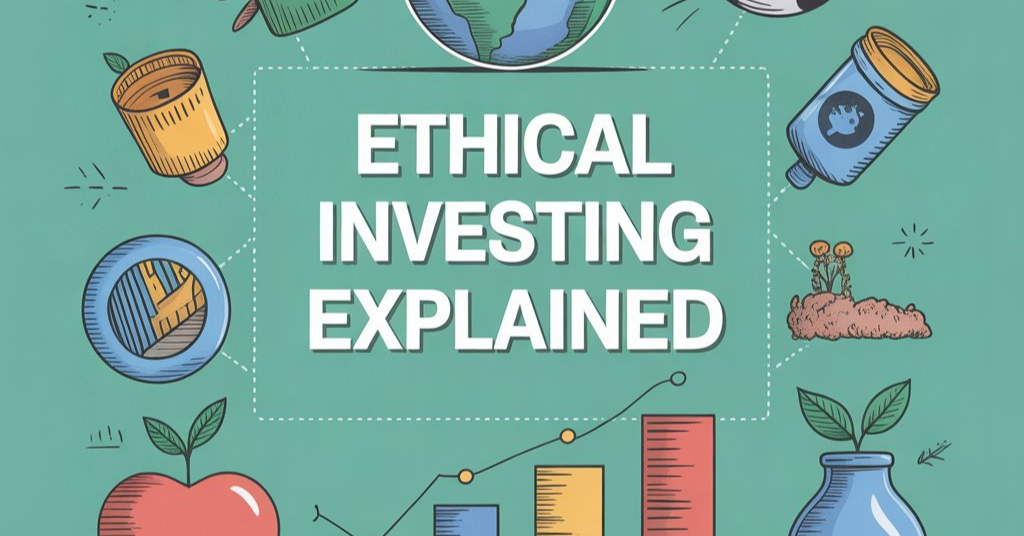In today’s world, many investors don’t just care about profits—they also care about the impact their money makes. Ethical investing is an investment approach that combines financial goals with moral or social values.
For example, an investor may choose to avoid companies that harm the environment and instead put their money into renewable energy businesses. This way, their portfolio not only grows financially but also supports positive change.
Ethical investing has become very popular in the U.S. as more people want their investments to match their values. According to a 2022 survey, nearly 70% of American investors said they prefer funds that consider environmental, social, and governance (ESG) factors. Let’s get into ethical investing explained.
Why Ethical Investing Matters
There are three major reasons why ethical investing is important:
- Aligning with values – You can invest without compromising your personal or religious beliefs.
- Potential financial strength – Companies that practice sustainability and fairness often manage risks better.
- Influence and impact – Investors gain power to push companies toward better policies through shareholder votes.
📌 Example: Imagine two companies:
- Company A pollutes rivers, faces lawsuits, and risks government fines.
- Company B invests in clean energy and strong worker rights.
An ethical investor would prefer Company B, not only because it aligns with values but also because Company B is less likely to face costly penalties in the future.
Ethical Investing vs. Other Approaches
Ethical investing is often confused with related terms. Let’s break them down:
- SRI (Socially Responsible Investing): Avoids industries considered harmful (tobacco, gambling, weapons).
- ESG (Environmental, Social, Governance): Considers sustainability and corporate responsibility as part of financial analysis.
- Impact Investing: Focuses on making measurable positive social or environmental impact.
- Faith-Based Investing: Aligns with religious guidelines, such as avoiding alcohol or pork-related industries.
👉 Example:
- An SRI investor might avoid oil companies.
- An ESG investor might invest in oil companies only if they are transitioning to renewable energy.
- An impact investor might directly fund solar energy projects.
Types of Ethical Investments
- Mutual Funds and ETFs: These funds pool money and invest in ethical companies. Example: iShares ESG Aware ETF.
- Green Bonds: Bonds that raise money for environmental projects like wind farms.
- Impact Funds: Funds directly targeting measurable outcomes, such as reducing carbon emissions.
- Faith-Based Funds: Popular in the U.S., such as the Ave Maria Mutual Funds that avoid industries against Catholic values.
Ethical Investing Explained: Pros and Cons
✅ Advantages
- Matches investments with personal beliefs.
- Encourages companies to adopt ethical practices.
- Studies show ESG funds often perform as well as or better than traditional funds.
❌ Disadvantages
- Requires research; “greenwashing” (false claims) is common.
- Some sectors are excluded, which may limit diversification.
- Fees can be slightly higher in ESG or SRI funds.
Example: Comparing Returns of Ethical vs Traditional
Let’s say you invest $10,000 in two different funds for 10 years:
- Traditional Fund grows at 8% annually.
- Ethical Fund grows at 8.5% annually.
Calculation
- Traditional: $10,000 × (1 + 0.08)¹⁰ ≈ $21,589
- Ethical: $10,000 × (1 + 0.085)¹⁰ ≈ $22,937
📌 Result: Ethical investing doesn’t mean sacrificing returns. In this example, it actually earned $1,348 more.
How to Build an Ethical Portfolio (Step-by-Step)
1. Define Your Values
Do you care about climate change? Worker rights? Avoiding animal cruelty? Make a list.
2. Choose a Strategy
- Negative Screening: Exclude harmful industries.
- Positive Inclusion: Invest in companies leading sustainability.
- Best-in-Class: Pick top ethical performers in every sector.
3. Select Investment Vehicles
- Use robo-advisors like Betterment or Wealthfront that offer ESG portfolios.
- Explore ESG ETFs like Vanguard ESG U.S. Stock ETF.
- Buy individual stocks of ethical companies like Tesla (clean energy) or Beyond Meat (plant-based food).
4. Do Due Diligence
Always check fund fact sheets, ESG ratings, and whether the fund’s claims are genuine.
5. Consider Costs and Risks
Some ethical funds have higher management fees. Compare before investing.
U.S. Examples of Ethical Investments
- Green Bonds Issued by Apple: In 2022, Apple raised $1.5 billion for renewable energy projects.
- Tesla: A favorite among U.S. ethical investors for its electric vehicles and clean energy solutions.
- Beyond Meat: Appeals to investors avoiding animal-based products.
Institutional Guidelines
- UN Principles for Responsible Investment (PRI): Over 5,000 global signatories managing $128 trillion follow these standards.
- Morningstar ESG Ratings: Helps investors measure the sustainability level of funds.
- SEC Regulations: In the U.S., regulators are cracking down on misleading ESG claims, protecting retail investors.
Does Ethical Investing Really Make a Difference?
Some critics argue that avoiding “bad” companies doesn’t directly harm them, since other investors might still buy their shares.
However, research shows that:
- Ethical investors increase demand for sustainable companies, raising their stock prices.
- They lower the cost of capital for ethical firms, making them more competitive.
- Companies change policies when investors push through shareholder activism.
📌 Example: In 2021, activist investors gained seats on ExxonMobil’s board to push for greener strategies. This happened because ethical shareholders voted for change.
Also Read: How to Get Started with Sustainable Investing
Ethical Investing During Market Volatility
One major question is: Are ethical investments safe during downturns?
Studies show ESG funds often perform better during crises.
Example: During the COVID-19 pandemic (2020), Morningstar reported that 77% of sustainable equity funds outperformed traditional peers.
This resilience happens because ethical companies often:
- Have better risk management.
- Avoid scandals and lawsuits.
- Operate with strong governance.
Future of Ethical Investing in the U.S.
- Millennials and Gen Z show the strongest preference for ethical investments.
- Robo-advisors and retirement accounts are increasingly offering ESG options.
- By 2030, experts predict over one-third of all U.S. assets under management will be invested ethically.
Quick Comparison Table
| Feature | Traditional Investing | Ethical Investing |
| Goal | Maximize returns | Balance returns & values |
| Industries | All included | Excludes harmful ones |
| Returns | Historically 7–10% | 7–10%, sometimes higher |
| Example | Oil, tobacco, gambling | Renewable energy, green bonds |
Conclusion
Ethical investing is no longer a niche trend—it is becoming a mainstream choice in the U.S. It gives investors the power to grow wealth while supporting companies that make a positive difference.
By understanding the different approaches (SRI, ESG, impact), weighing pros and cons, and using real calculations, you can build a portfolio that reflects both your financial goals and personal values.
Ethical investing explained in simple terms: it’s about doing well financially by doing good socially. Whether you’re just starting with $100 or managing thousands, your money can create real change in the world.










